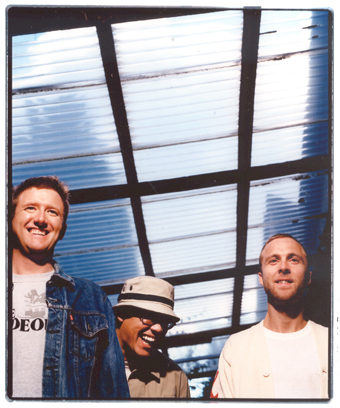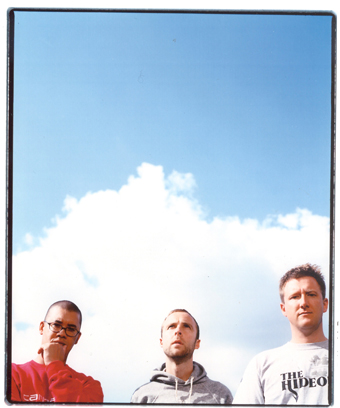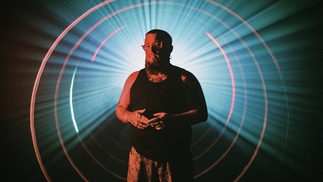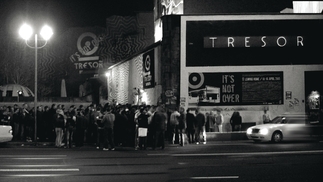X-PRESS 2 'SMOKE MACHINE'
The seminal tracks that changed dance music forever

X-Press 2 were one of the principal house acts in the early '90s, rocking the floors with cuts like post-hardcore progressive house cut 'Muzik Xpress' — with its memorable “Music, music, music” refrain — and the cowbell-tastic 'London Xpress'. The trio of acid house originals — Rocky, Diesel and Ashley Beedle — went their separate ways for a while in the late '90s, before coming back together just before the Millennium.
“It was Terry Farley who instigated it,” recalls Rocky, “he was up in Ashley's studio and found a sample of some old funk thing. He said to Ashley, 'You should do a new X-Press 2 record using something like this as an idea, before someone else does it'.”

The three DJ/producers went into the studio with the sample idea, and the result was the tribal-tinged 'AC/DC' – one of the strongest tracks of their career. Reinvigorated, they did a couple of remixes — Green Velvet's 'Answering Machine' and others — got a new manager onboard, and got an album deal with Skint Records — the label Norman Cook, aka Fatboy Slim, was signed to.
As an integral part of the quality London house music scene, X-Press 2 were regulars at the Miami Winter Music Conference (WMC). Their highlight was always Danny Tenaglia's marathon parties in Miami — and their Game Changer, 'Smoke Machine', was inspired by a particular moment at one of Tenaglia's parties.
“It was made for his parties, inspired by a particular moment,” confirms Rocky. “It was the first year he moved from Groovejet to Space, and I think I was maybe just out there on my own without the other guys. After 2001, Tenaglia's parties started getting a bit too big, I think 2001 and 2002 were the last great ones, before that at Groovejet it was off the scale — ridiculous.
It was all about the people who were there, the way it flowed musically... they were pretty special parties, everybody you'd known from clubs around that period were all in that one place on that one night. Some of my best moments I've ever had in clubs were at those parties.
“I can remember going to the Space party, which was like a deep cavernous warehouse,” Rocky continues. “It was five or six o'clock in the morning, and it had been brilliant up to that point. I was stood in the middle of the dancefloor with a bunch of mates, all totally into the music, heads-down — and the track that was playing, I later discovered, was called 'Latin Static' by Sound 5, which was a Kelvin Andrews project. It had that chopped-up vocoder thing in it, like a Speak & Spell voice, and they had a huge smoke cannon in there which, when fired, chilled the club by about 10 degrees, firing into the crowd. It was the first time I'd experienced anything like that.”
Rocky recounts being enveloped by a cloud of smoke from the smoke cannon while the aforementioned chuggy Rip Records house cut with its robo vox was playing, “and there was a point when I opened my eyes and Pete Heller did the same thing at the exact same moment,” he says. “We were looking at each other with the same expression – 'What the fuck is going on here!?' That was the moment that inspired 'Smoke Machine'.”

Returning from Miami, Rocky started raving to the others about that particular moment, and they immediately started trying to work up a track using a vocoder sample. “Because it was such a strong idea that I'd come back with, it flowed easily,” Rocky remembers. “It fell into place.”
Tribal beats and the muted mangled-monkey cry flowed naturally for this Tenaglia tribute before an elongated siren sound and grinding linear bassline really built the track's pressure. Rocky struggles to remember if it was himself or Ashley Beedle who actually spoke the words “Smoke machine” for the track, eventually concluding that Ashley did 'Smoke Machine' and he did 'AC/DC'. “We did a lot of that sort of stuff, set up a mic, speak whatever it was, and pitch it down to sound a bit weirder,” he says.
The actual smoke machine sound in the breakdown was a sample from one of those old sound effects albums, Rocky says. “It was a steam train or something like that, and we put some white noise underneath it. Then EQ'd it, boosting the signal to make it sound more like a smoke cannon.”
Produced in Ashley's studio in Hornsey, north London — in the same room as they recorded some of their most recent album, funnily enough — using quite a basic set-up involving Akai samplers and a huge old mixing desk, the track took no longer than two days, Rocky reckons. “It was one of those where everything just fell into place.”
The X-Press 2 guys were fairly sure that they'd made a big tune when they finished it, confirms Rocky. “A lot of the time you have no idea, but with 'Smoke Machine' because we had such a strong idea in the first place and we really knew where it was going to go, we were fairly confident it would appeal to certain people,” he says. “We've kind of always made stuff that way, having a certain club or DJ in mind when doing stuff. It was definitely those Miami parties that brewed things up.”
Despite being a dark, tribal club track — perhaps THE dark, tribal club track — the release cracked the UK Top 50, and the sound and lights guys in clubs have used the breakdown as a cue to whack on the smoke machine ever since. “It was a happy accident really,” says the man born Darren Rock. “We just felt that's how it naturally sounded, and it worked.
“My main memories of the tune are watching people go absolutely bananas to it, from little clubs of 200 people to stadium-sized things of 30- or 40,000 people,” Rocky concludes. “Playing in Sao Paulo in Brazil and a thing in Amsterdam and seeing that many people go barmy to something you've created were pretty special memories. When you get that response to something you're responsible for, there's nothing like it.
“We still play it today — it'd be silly not to,” he continues, alluding to their continued globetrotting that now occurs minus Ashley Beedle (who's still a good friend). “There's a couple of other tunes — 'Muzik Xpress' and 'Lazy' [their deep house smash with David Byrne from Talking Heads on vocals] — that we can't not play or we'd get lynched. We don't get bored of them, either — it doesn't happen if you're that happy and satisfied with something you've done.”





